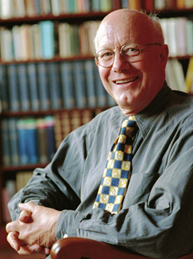Refining the Wasteland
BU's Christopher Ricks to edit first complete edition of T. S. Eliot

In one of the great contemporary literary paradoxes, the poems of T. S. Eliot, one of the most influential literary figures of the 20th century — and a publisher to boot — have never been collected and published in a complete edition. There has been much speculation about the reason, and Valerie Eliot, the poet’s widow and literary executor, is often blamed, because she has exerted a tight hold on her late husband’s work. Christopher Ricks, BU’s William M. and Sara B. Warren Professor of the Humanities and the editor of an early edition of Eliot’s unpublished poems, dismisses that theory as “melodrama” and offers this explanation: it was Eliot himself who questioned the wisdom of collecting — and analyzing — his life’s work.
“I think Eliot had, as every poet should have, mixed feelings about editions,” says Ricks, noting that complete editions may include original versions of work that a poet revised over time. “It’s part of a continuing drama about poets and their work — one principle is that a man or a woman who is a creator has a right to be judged by what he or she wanted. On the other hand, if I were a man of 20, I would be very angered if a man of 80 were to tell me what my poems should be.”
Now, 42 years after Eliot’s death — and as his widow approaches her 81st birthday — Ricks has been asked to play a critical role in resolving that paradox by editing a volume of Eliot’s complete poems, to be released in conjunction with editions of his prose and his personal letters. The Complete Poems, which will be published by Eliot’s own publishing house, Faber & Faber in Britain, will include works such as The Waste Land and Four Quartets, as well as such lighter verse as Old Possum’s Book of Practical Cats, the series of poems that inspired the musical Cats.
For Ricks, who in 1963 reviewed the last edition of poems published in Eliot’s lifetime and in 1997 edited a collection of Eliot’s previously unpublished verses, Inventions of the March Hare, the opportunity to edit and annotate Eliot’s complete verses fulfills a lifelong goal. “I genuinely think anybody who cares about 20th-century literature has to recognize Eliot’s importance, his unignorability, the extraordinary range of things he cared about and wrote about,” Ricks says. “There are many aspects in which some of his work is not nice at all. But there is no subject on which he does not have a view which needs to be contested.”
While Eliot’s published poems are still widely circulated, according to Ricks the advantage of a critical edition lies in the reader’s discovery of “bonuses” that provide social or historical context, and thus greater insight into Eliot’s meaning and technique. The invested reader can also benefit from an editor’s own observations or theories, Ricks says — for instance, many readers will know the source of the “Prince Hamlet” reference in The Love Song of J. Alfred Prufrock, but annotations reveal that the subsequent lines describing “an attendant lord” as “politic, cautious, and meticulous” contain all the letters in the name Polonius — the attendant lord to Hamlet in Shakespeare’s play.
“With a poet as good as Eliot, the notes are never the price of admisson — it’s a kind of bonus,” Ricks says. “But I think the lines are enriched by something that the poet knew, that he thought at least some of his audience would know. It’s very fine on its own, but I feel a kind of gratitude to the editors who give me that bit of information.”
Ricks, who is a codirector of Boston University’s Editorial Institute, is currently working on an 11-volume edition of the selected works of the Victorian lawyer Sir James Fitzjames Stephen, funded by the Andrew W. Mellon Foundation Distinguished Achievement Award he received in 2003. He expects to begin work on the Eliot series in the next few months.
Jessica Ullian can be reached at jullian@bu.edu.